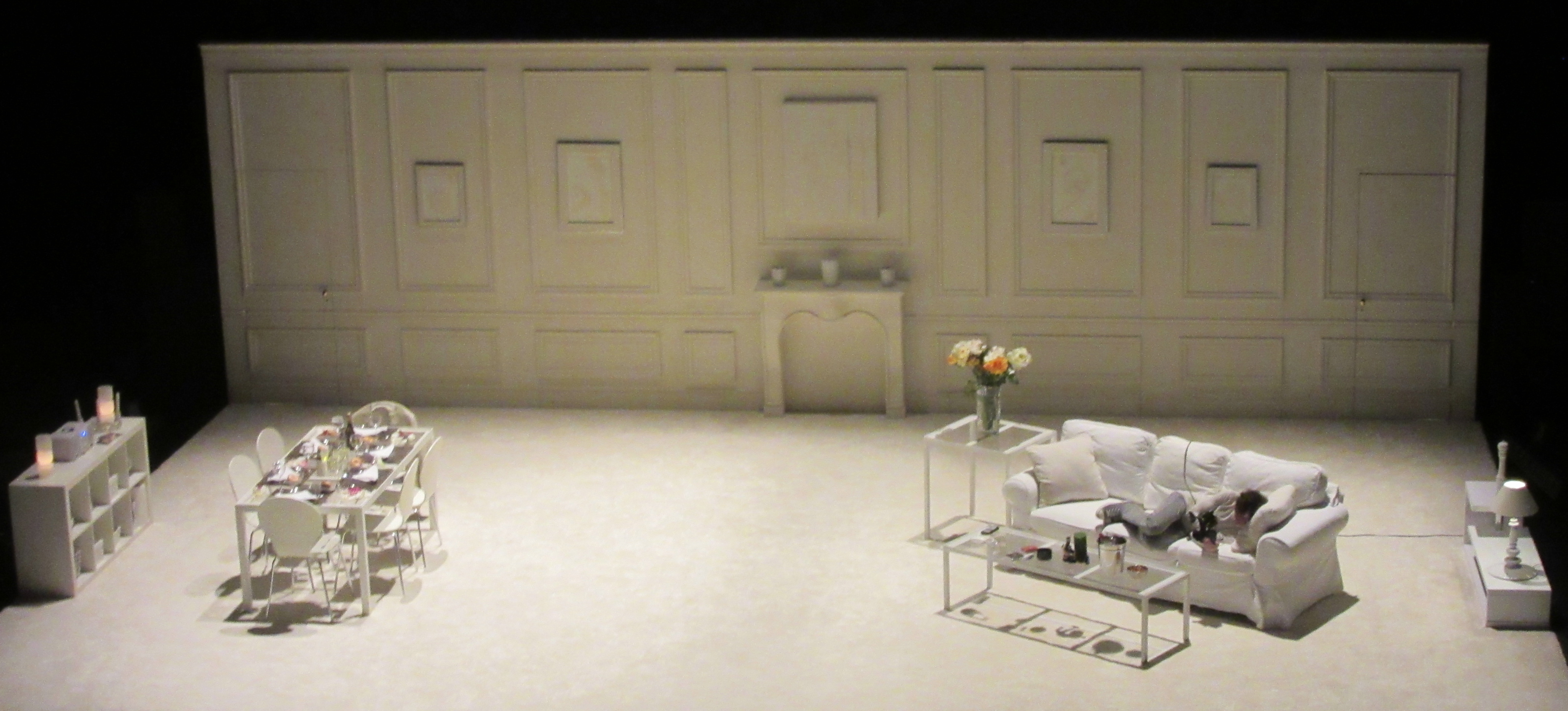Cheek by Jowl’s UBU ROI is a brilliant contradiction. It is austere and messy, infantile and wise, ego and id, beautiful and repulsive. It hangs together and falls apart. Lasts long and ends soon. Grosses out and achieves epiphany. It is not to be missed and – no, it is not to be missed. Not, if you have never seen Alfred Jarry’s missing link of a play, that, once found, connects Rabelais to Dalí, de Sade to Pasolini, Büchner to Arrabal. Not, if you see in Europe’s endless wars of succession and hereditary rule the root of the Great War and the fascists who followed it. Not, if you value privacy and dream voyeuristically. Not, if you care about art and see in its defilement an ironic affirmation. Not.
You know when you see the kid on the couch in the pristine French living room, curled up with his vid-cam like a mutt with a bone, that he will pop like a pimple on the face of civilized things. He can’t exist in the world except that he make it his own. He’s the thing you would have strangled in the crib if you could have read its thoughts. But there he is, with his infernal camera, framing the world to his liking, exposing in close-up all the drips and dollops of snot, urine and excrement that you otherwise wouldn’t have noticed. Before you know it his dreams and fantasies are reified too, before our eyes, which when they blink can go in an instant between sleep and waking, puerility and adulthood, scatology and cleanliness. But always the residue of his infantile musings is left, the room filling up, as the night goes on (there is a dinner party underway), with the reptilian detritus of his brain, first a dropped scarf that no one picks up, by the end a trash dump of juvenile desire.
Time out. The play was first seen in Paris at the rump end of 1896. It is sort of a version of Macbeth, starting with Mère Ubu urging on Père Ubu to murder good King Wenceslas and take the throne (premiering in December, I suppose this would have made it a Christmas play as well). There follows an infantile fantasy made real, of bathroom wit, witless de-brainings, political satire on a locker room level, the upending of taste and the pretensions of art. It was upon attending the premiere that Yeats, as the notes to the production remind us, declared, “After us the Savage God.” Ubu roi (Ubu the King) is the unconscious unchained, the dream we don’t talk about enacted, the thought repressed followed through.
But it is also, as the director Declan Donnelian makes elegantly clear, astute in its understanding of power and the desire some (all?) have for it. Jarry’s mad king seems to have read Hegel and Nietschze and been analyzed by Freud. Whoever serves the ruler, whether judge or financier, exercises power by doing so, and so they must be eliminated and the ruler be singly responsible for the adjudging and accounting. Technology doesn’t change this, as Cheek by Jowl’s pulling of the play into the present attests. Indeed it is accentuated. The gaze of the camera is controlling, or seems so to the one holding it, yanking the subject into the mind of the controller, and once there grist for fantasy and dream.
Donnelian and his designers (Nick Ormerod, set; Pascal Noël, lights; Beniot Simon and Quentin Vigier, video) delineate this exquisitely. We flash like lightning between dream and dinner party, video and the theater, civilization and the Savage God. None of which could be done without the actors, Christophe Grégoire, Camille Cayol, Xavier Bolffier, Vincent de Boüard, Cécile Leterme and Sylvain Levitte. They need, perhaps, to be eliminated, given the power they have over things, but if there is a smidgen of hope in the production’s view of human nature it is that they can’t be. Their turns on dimes between art and the infantile can be made by no one else. They must be seen doing it. It is, ultimately, the unconscious proteanism of human nature that is the point of this production. We can be adults or we can be infants, mongers of power or generous hosts, tyrants or democrats.
What Jarry would have thought of this is speculative. Cheek by Jowl convinced me that Ubu is a great play rather than just historically important. He may not have approved its canonization. But that his view of humanity has been validated by a century and more of slaughter and power play, and pertains to this day, might have given him, if not satisfaction, at least a sense that he was right about it. Donnellian didn’t plug any contemporary names into the dialogue (“Putin,” for example, or “Merkel”) but he could well have done so. Probably it is best that audiences do so themselves. That power is a childish thing this production is an exhilarating illustration of. It shouldn’t be missed. Not. It plays through Sunday at Lincoln Center Festival.
Click here for Lincoln Center Festival information. Visit Cheek by Jowl for more on the Barbican associated company, which produces shows in English, French and Russian.

2 responses to “Ubu roi”
[…] fawned over by a mishmash of barefoot dancers and faux dwarves, might be a scene from Jarry’s Ubu or Ionesco’s Exit the King. Surely, one thinks, he is just an envious man putting on airs. But […]
[…] fawned over by a mishmash of barefoot dancers and faux dwarves, might be a scene from Jarry’s Ubu or Ionesco’s Exit the King. Surely, one thinks, he is just an envious man putting on airs. But […]